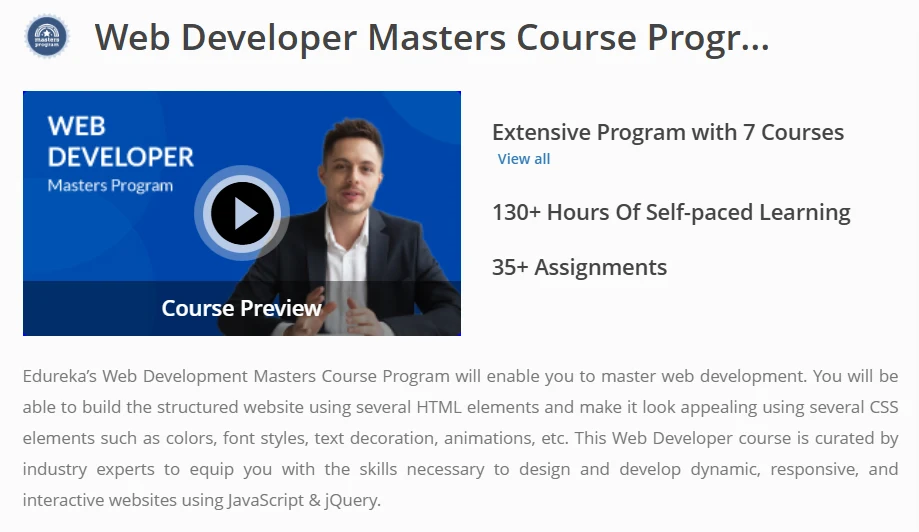What will you learn in Web Developer Masters Course Program
Build responsive, semantic web pages with HTML5, CSS3, and modern layout techniques (Flexbox, Grid)
Master JavaScript fundamentals and ES6+ features to create dynamic client-side experiences
Develop single-page applications using React and Angular, including state management and routing
Implement server-side logic with Node.js/Express and build RESTful APIs connected to MongoDB/MySQL
Integrate DevOps practices: Docker containerization, CI/CD pipelines, and cloud deployments (AWS/Azure/GCP)
Program Overview
Module 1: Foundations of Web Development
⏳ 2 weeks
Topics: HTML5 semantics, CSS selectors, box model, responsive design principles
Hands-on: Build a multi-section landing page with responsive navigation and image galleries
Module 2: Advanced JavaScript & Tooling
⏳ 2 weeks
Topics: ES6+ syntax (arrow functions, destructuring), asynchronous patterns, NPM/Yarn
Hands-on: Create modular scripts, fetch data from public APIs, and bundle with Webpack
Module 3: Front-End Frameworks
⏳ 3 weeks
Topics: React (JSX, hooks, context) and Angular (components, services, RxJS) fundamentals
Hands-on: Develop a SPA—user authentication, data tables, and client-side routing
Module 4: Back-End Development
⏳ 2 weeks
Topics: Node.js/Express app structure, middleware, error handling, RESTful API design
Hands-on: Implement CRUD endpoints for a blog system with JWT-based auth
Module 5: Databases & Persistence
⏳ 1 week
Topics: MongoDB with Mongoose OR MySQL with Sequelize, schema design, indexing, migrations
Hands-on: Model user, post, and comment entities; run complex queries and pagination
Module 6: DevOps & Deployment
⏳ 1 week
Topics: Dockerfile creation, Docker Compose, GitHub Actions/Terahub CI, cloud provisioning
Hands-on: Containerize full-stack apps, automate tests/builds, and deploy to AWS Elastic Beanstalk
Module 7: Testing & Quality Assurance
⏳ 1 week
Topics: Jest/Mocha for JavaScript, React Testing Library, Supertest for APIs, ESLint/Prettier
Hands-on: Write unit and integration tests covering frontend components and backend routes
Module 8: Capstone Project – Production-Ready Web App
⏳ 3 weeks
Topics: End-to-end architecture, monitoring (Prometheus/Grafana), logging (ELK stack), performance tuning
Hands-on: Plan, build, and deploy a collaborative project (e.g., task manager or e-commerce prototype)
Get certificate
Job Outlook
Web developers with full-stack expertise are in high demand across tech startups, agencies, and enterprises
Roles include Front-End Developer, Back-End Developer, Full-Stack Engineer, and DevOps-Enabled Web Developer
Salaries range from $75,000 to $140,000+ depending on experience, stack proficiency, and region
Mastery of modern frameworks, cloud deployment, and testing best practices accelerates career growth
Explore More Learning Paths
Take your web development mastery even further with these carefully curated programs designed to enhance your front-end and full-stack capabilities while strengthening your professional portfolio.
Related Courses
Web Development for Beginners Specialization Course – Build a strong foundation in web technologies and start creating responsive sites with confidence.
HTML, CSS, and JavaScript for Web Developers Course – Develop essential front-end skills to design modern, interactive, and user-friendly web pages.
HTML, CSS, and JavaScript for Web Developers Specialization Course – Deepen your expertise across the core web development stack and build real-world projects that showcase your skills.
Related Reading
Gain deeper insight into how project management drives real-world success:
What Is Project Management? – Understand the principles that make every great project a success story.
Specification: Web Developer Masters Course Program
|
FAQs
- No prior experience is strictly required; the course starts with beginner-friendly topics.
- Learners are introduced to HTML, CSS, JavaScript, and core web development concepts.
- Step-by-step lessons help build a strong foundation before moving to advanced topics.
- Basic computer literacy helps, but all programming concepts are explained clearly.
- By the end, learners can confidently create functional websites and web applications.
- Yes, the program covers full-stack web development.
- Frontend skills include HTML, CSS, JavaScript, React, and responsive design.
- Backend topics include Node.js, Express, databases, and RESTful API development.
- Projects integrate frontend and backend skills to build real-world applications.
- Advanced backend frameworks or deployment strategies may require additional practice.
- Yes, the program emphasizes hands-on projects and practical exercises.
- Learners create websites, web applications, and API-integrated projects.
- Guidance is provided for deploying projects online for portfolio showcase.
- Projects reinforce both frontend and backend development concepts.
- Consistent practice ensures learners can showcase skills to potential employers.
- Yes, the program covers working with databases like SQL and NoSQL options.
- Learners practice CRUD operations, querying, and integrating databases with web applications.
- Techniques include connecting backend servers to manage dynamic data efficiently.
- Database optimization and security fundamentals are briefly discussed.
- Advanced database concepts may require additional study after the course.
- Yes, deployment concepts are included to make projects live on the internet.
- Learners practice hosting websites on servers or cloud platforms.
- Guidance is provided on domain setup, hosting, and environment configuration.
- Deploying portfolio projects enhances real-world skills and employability.
- Advanced deployment techniques like CI/CD pipelines may require further learning.





